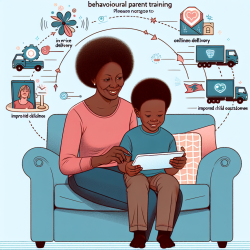Introduction
Nonsuicidal self-injury (NSSI) is a critical public health issue affecting approximately 13% of young adults globally. Despite the availability of evidence-based treatments, many young adults do not receive the necessary care due to various barriers such as cost, stigma, and geographical limitations. Digital interventions, particularly mobile apps, offer a promising alternative to traditional therapy by providing scalable, cost-effective, and accessible mental health support.
The Promise of Mobile Apps
The study "Developing a Mobile App for Young Adults with Nonsuicidal Self-Injury: A Prototype Feedback Study" explores the potential of mobile apps to support young adults in managing NSSI. Through iterative feedback sessions with young adults, the study identified key features and functionalities that could enhance the app's effectiveness.
Key Findings and Implications for Practitioners
- Personalization: Participants emphasized the need for goal personalization, allowing users to define their own goals while providing scaffolding to support decision-making. Practitioners can leverage this insight by encouraging clients to set personalized goals within digital interventions.
- Flexibility in Tracking: The study highlighted the importance of flexible tracking mechanisms that respect user privacy and comfort. Practitioners should consider incorporating optional tracking features that empower users to control their data.
- Connection to Crisis Resources: Easy access to crisis resources was a unanimous need among participants. Practitioners should ensure that digital tools provide clear pathways to crisis services and skills for immediate support.
- Adapting to Changing Needs: As users' relationships with NSSI evolve, the app should adapt to meet their changing needs. Practitioners can encourage clients to regularly update their goals and preferences within the app.
- Data Aggregation for Reflection: Participants expressed a desire for the app to aggregate data for reflection and pattern recognition. Practitioners can guide clients in using this data to gain insights into their behaviors and develop coping strategies.
Encouraging Further Research
While the study provides valuable insights, further research is needed to explore the long-term efficacy of mobile apps in supporting NSSI self-management. Practitioners are encouraged to engage in research collaborations to enhance the development of digital interventions.
Conclusion
Mobile apps have the potential to revolutionize therapy for young adults with NSSI by providing accessible, personalized, and flexible support. By implementing the findings from this study, practitioners can enhance their skills and contribute to the development of effective digital interventions.
To read the original research paper, please follow this link: Developing a Mobile App for Young Adults with Nonsuicidal Self-Injury: A Prototype Feedback Study.










